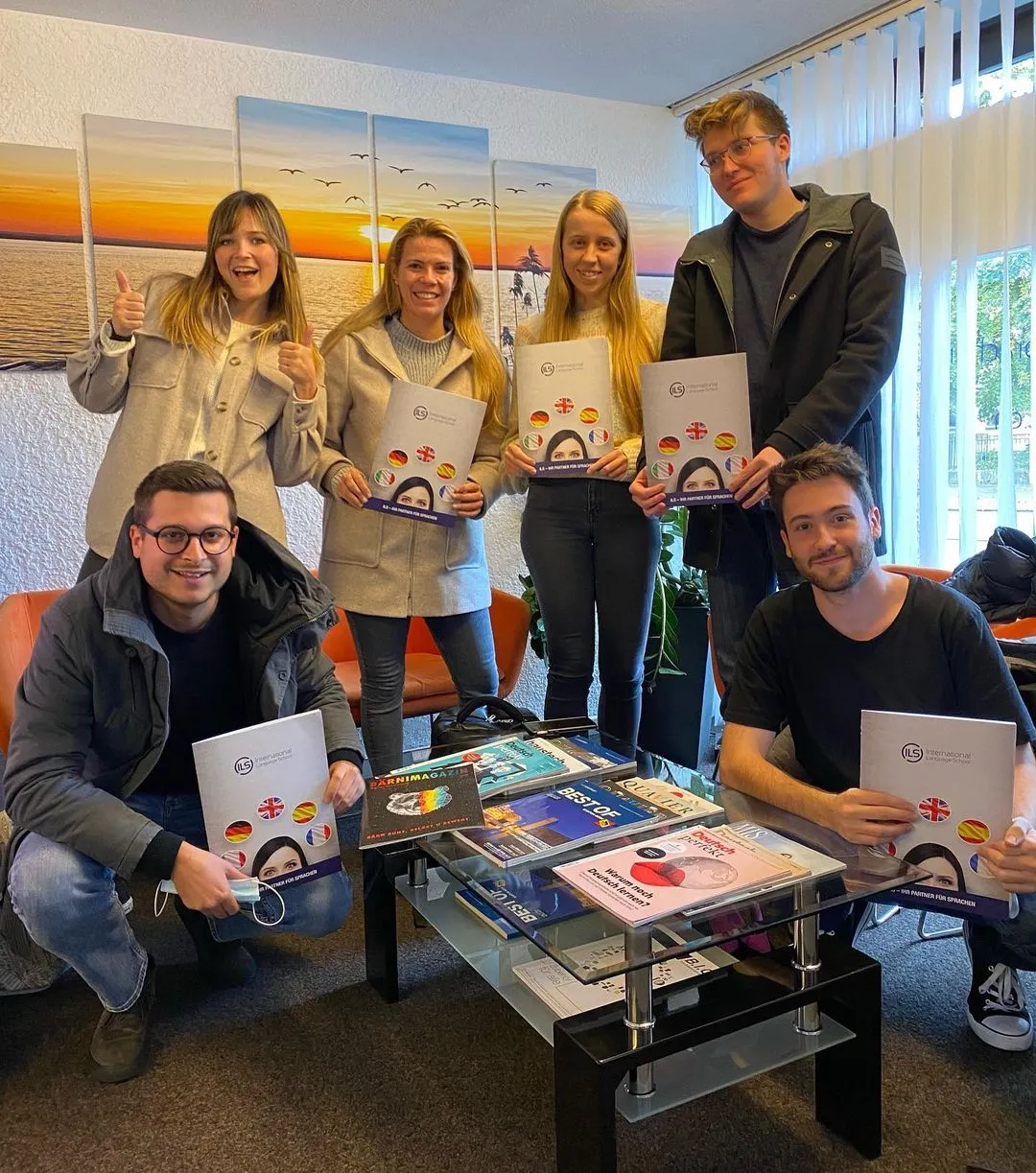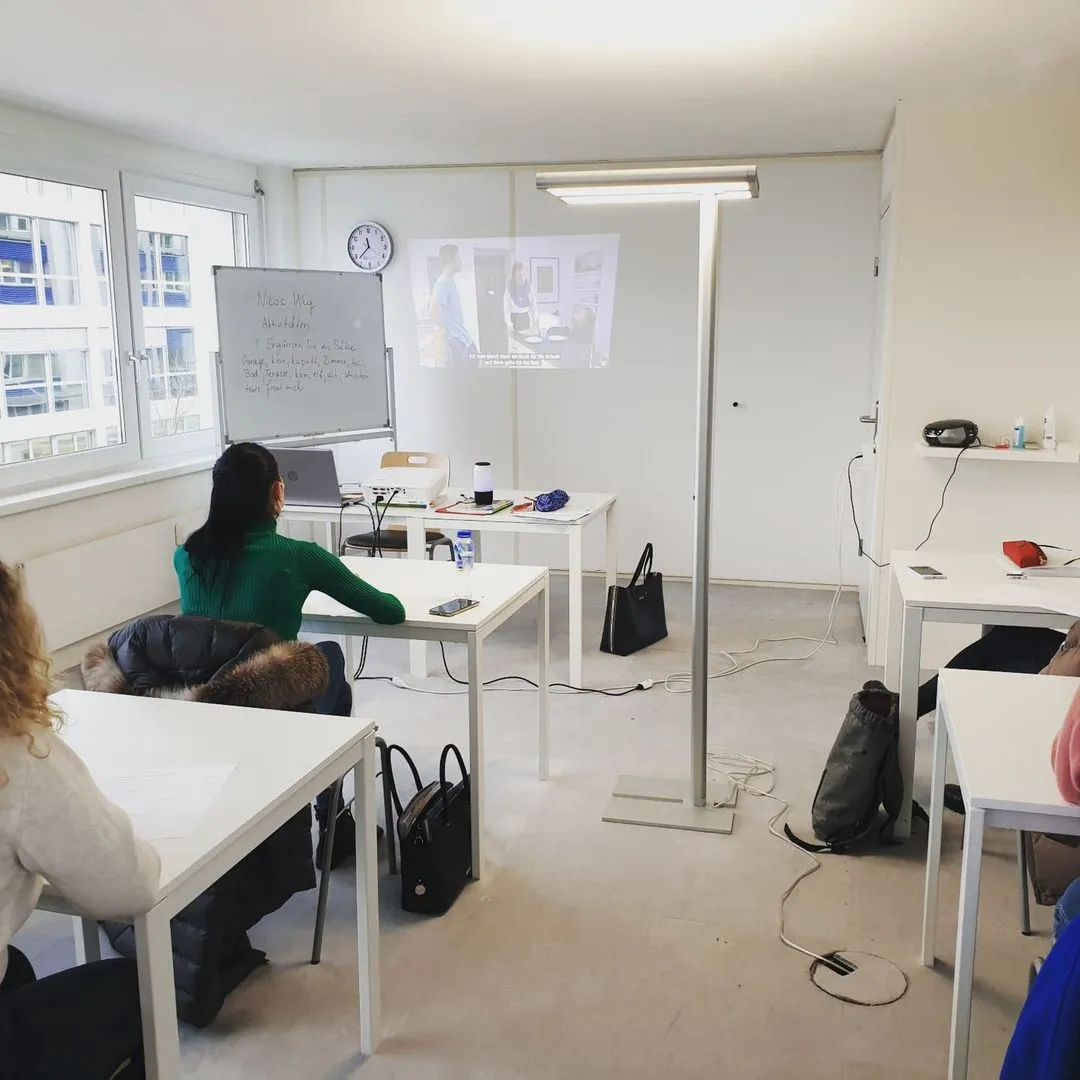
Haben Sie sich das Ziel gesetzt, richtig und fliessend Deutsch sprechen sowie schreiben zu lernen? Möchten Sie auch endlich die komplexe und weitreichende deutsche Grammatik korrekt beherrschen können und spannende Unterhaltungen auf Deutsch mit Hilfe eines breiten Wortschatzes führen?
Deutsch ist eine der wichtigsten Sprachen der heutigen Zeit. Es gibt zahlreiche Gründe, um mit dem Deutsch lernen zu beginnen. Besonders in der Schweiz ist Deutsch eine Amtssprache und dadurch von enormer Wichtigkeit. Egal ob man Deutsch aus Integrations-, Einbürgerungs-, beruflichen Gründen oder aufgrund von privatem Interesse lernt, es ist und bleibt eine sehr komplexe und schwierige Sprache. Für viele Lernenden stellt es eine immense Herausforderung dar, Deutsch zu lernen.
In diesem Artikel erfahren Sie alles rund um das Thema Deutschlernen und wir teilen mit Ihnen die besten Tipps und Tricks, um möglichst schnell Erfolge zu erzielen.
Deutsch lernen durch professionelle Sprachkurse
Am schnellsten und deutlichsten erzielen Sie Lernerfolge, wenn Sie einen professionellen Deutschkurs besuchen. Etliche Erfahrungswerte und Befragungen zeigen, dass Sprachlernende schneller ihr jeweiliges Sprachniveau erreichen, wenn sie regelmässig einen professionellen Sprachkurs besuchen. Ausserdem fällt es den Lernenden leichter, wenn sie einen Deutschkurs besuchen, die Fremdsprache zu lernen und motiviert sowie am Ball zu bleiben. Folgende Gründe sind dafür verantwortlich:
Es ist sehr schwierig eine Sprache alleine zu lernen. Die deutsche Grammatik ist sehr komplex, weitreichend und hält viele Ausnahmen oder Sonderfälle bereit. Verständnisprobleme und Schwierigkeiten beim Lösen von Übungen sind keine Seltenheit, wenn man versucht, alleine Deutsch zu lernen. Niemand ist da, der Wissenslücken aufklärt und Missverständnisse aus dem Weg räumt. Gelerntes muss ausserdem kontinuierlich angewendet werden, nicht nur in Form von Übungen, sondern auch durch aktives Sprachtraining und das Simulieren von Alltagssituationen. Ohne das Üben und Anwenden der Fremdsprache, gerät das mühsam Erlernte schnell wieder in Vergessenheit. Zudem werden Schwierigkeiten oder Verständnisprobleme oft erst beim Anwenden der Sprache ersichtlich. Auch ist es wichtig, dass Sprachlernende auf ihre Fehler unmittelbar hingewiesen werden, ansonsten werden sie möglicherweise noch zur Gewohnheit. Zudem kommt, dass schnell die Motivation verloren geht, wenn man mit diesem Berg an Grammatikregeln und Vokabeln alleine ist und nicht mit einem strukturierten Konzept lernt.
All diesen Schwierigkeiten wirken professionelle Sprachkurse entgegen.
Die wichtigsten Vorteile eines professionellen Sprachunterrichts zusammengefasst:
- Regelmässiges und aktives Anwenden der deutschen Sprache durch verschiedene vielfältige Formen und Übungen
- Unmittelbares Aufklären von Verständnisproblemen und gezieltes Training von persönlichen Schwierigkeiten
- Professioneller Deutschunterricht angepasst an das eigene Sprachlevel, individuelle Ziele, spezifische Schwierigkeiten und persönliche Präferenzen
- Auswahl an zahlreichen Unterrichtsformen und Deutschkursen, perfekt geeignet für den Alltag und individuelle Präferenzen (Privatunterricht, Gruppenkurse, Konversationstraining, spezifische Prüfungsvorbereitung für etliche Deutschzertifikate etc.)
- Hochqualifizierte Lehrpersonen mit mehrjähriger Erfahrung im Unterrichten der deutschen Sprache als Ansprechperson
- Bewährtes und von Sprachlehrern erstelltes Lernkonzept mit auf das jeweilige Sprachniveau angepassten Lernzielen und gezielten Übungen
- Schneller Lernerfolg
Ein professioneller Deutschkurs ist die beste Option um möglichst rasche Lernfortschritte zu erzielen und eine lohnenswerte Investition in sich selbst und die eigene Zukunft.
Übung macht den Meister
Egal ob Sie alleine Deutsch lernen oder an einem Deutschkurs teilnehmen, es muss unbedingt auch privat viel geübt werden. Übung macht den Meister. Je mehr Sie üben, desto besser wird Ihr Deutsch und desto schneller machen Sie Fortschritte. Einen breiten Wortschatz können Sie nur erreichen, wenn Sie die entsprechenden Vokabeln lernen und dann auch anwenden, damit sie gefestigt werden. Grammatikregeln und Sonderfälle müssen zuerst verstanden, dann gelernt, aber schlussendlich auch immer kontinuierlich angewendet werden, damit Deutsch für Sie intuitiv wird und Sie ein Sprachgefühl entwickeln. Beim Üben ist es auch wichtig, dass Sie Fehler machen. Fehler sind gut, denn dabei merken Sie, wo noch Schwierigkeiten oder Missverständnisse vorhanden sind und Sie können gezielt daran arbeiten. Beim Üben zeigt sich, ob das Gelernte wirklich verstanden wurde und der gesamte Stoffinhalt wird gefestigt. Falls Sie etwas nicht verstehen, dann recherchieren Sie im Internet nach, fragen Sie einen Freund, welcher bereits Deutsch spricht oder erkundigen Sie sich bei Ihrer Lehrperson, falls Sie einen Deutschkurs besuchen. Achten Sie beim Üben auch darauf, dass Sie eine gewisse Vielfältigkeit an Übungen nutzen. Versuchen Sie verschiedene Übungen zu einem Thema zu machen. Hilfreich ist es auch, wenn Sie sich eine feste Zeit für den Tag vornehmen, in welcher Sie nur Deutsch lernen. Schaffen Sie dadurch neue Gewohnheiten, kommen Sie in eine Lernroutine und bleiben Sie dran. Nur durch immerwährende Übung kann man ein gewisses Sprachgefühl entwickeln und rasch vorwärtskommen.
Integrieren Sie Deutsch in Ihren Alltag
Um zügig beim Deutsch lernen vorwärts zu kommen, sollten Sie versuchen, Ihre neuen Sprachkenntnisse in Ihren Alltag zu integrieren. Finden Sie Situationen im Alltag, in welchen Sie Ihre neuen Deutschkenntnisse anwenden können. Erzählen Sie Ihren Freunden und Ihrer Familie, was Sie Neues gelernt haben. Übersetzen Sie deutsche Texte, Lesen Sie Bücher sowie Zeitungen auf Deutsch. Schauen Sie sich Filme oder Fernsehsendungen auf Deutsch an oder übersetzten Sie Songtexte ins Deutsche. Sie können auch ins Café gehen und ihre Bestellung auf Deutsch machen. Spielen Sie Spiele auf Deutsch oder lösen sie Kreuzworträtsel. Es gibt zahlreiche kleine Gelegenheiten im Alltag, um ihr neues Können anzuwenden. Beginnen Sie damit, auf Deutsch zu denken und eine natürliche Intuition für Deutsch zu entwickeln.
Nutzen Sie Ihren Freundeskreis
Vielleicht gibt es Menschen in Ihrem Bekanntenkreis, welche bereits gut Deutsch können oder dessen Muttersprache Deutsch ist. Nutzen Sie diese Gelegenheit. Sprechen oder Schreiben Sie mit Ihren Freunden auf Deutsch. Verabreden Sie sich häufiger mit Ihnen. Bitten Sie Ihre Freunde darum, Sie zu korrigieren, falls Sie einen Fehler machen.
Sie können auch eine Brieffreundschaft mit jemandem starten, dessen Muttersprache Deutsch ist. Sie verfassen Ihre Texte dann auf Deutsch und Ihr Brieffreund antwortet Ihnen auf Ihre Muttersprache. Dadurch haben beide etwas davon und jeder lernt die Sprache des jeweils anderen.
Sie können auch an jeglichen Freizeitaktivitäten teilnehmen und dort Ihre Deutschkenntnisse anwenden. In Ihrem Sportverein gibt es sicher Menschen, welche Deutsch sprechen und mit denen Sie sich unterhalten können. Nutzen Sie diese kleinen Gelegenheiten und Chancen, um ihre Deutschkenntnisse anzuwenden und zu trainieren.
Ihr Freundeskreis wird damit beginnen, automatisch Deutsch mit Ihnen zu sprechen. Davon können Sie enorm profitieren. Deutsch wird für Sie immer einfacher und intuitiver. Sie lernen dabei Deutsch, ohne es richtig zu bemerken und Sie machen weniger Fehler und werden fliessender ohne grosse Mühe sprechen können.
Deutschkurse sind dabei natürlich auch ein immenser Vorteil, denn dort haben Sie eine Gruppe von Menschen, alle mit demselben Ziel. In Gruppenkursen können Sie aktiv ihr Gelerntes mit den anderen Kursteilnehmenden anwenden. Im Unterricht wird ein fehlerfreies und flüssiges Sprechen trainiert. In der Gruppe oder mit einem Gegenüber wird es Ihnen leichter fallen, Deutsch zu sprechen. Sie können sich in den Pausen gemeinsam unterhalten, sich nach dem Unterricht noch weiter treffen oder gemeinsam Übungen lösen. Es macht auf jeden Fall mehr Spass gemeinsam mit Gleichgesinnten Deutsch zu lernen.
Motiviert bleiben
Wichtig beim Deutsch lernen ist es auch, motiviert zu bleiben. Kontinuität ist das A. und O. Jedoch können Sie nur immerwährend am Ball bleiben, wenn Sie Freude am Lernen haben und dadurch motiviert bleiben. Die Motivation bleibt auch immer hoch, wenn sich Lernfortschritte deutlich bemerkbar machen und Sie sich nicht allein gelassen fühlen. Denken Sie daran, es ist kein Wettrennen, eine Fremdsprache zu lernen und Rückschläge sind völlig normal.
Hier die besten Tipps, um motiviert beim Deutschlernen zu bleiben:
- Bringen Sie Abwechslung ins Deutschlernen und nutzen Sie eine Variation bei den Übungsformen
- Machen Sie eine feste und realistische Zeit ab, in welcher Sie Deutsch lernen und belassen Sie es aber auch dabei
- Hören Sie auf sich selbst; falls es mal einen Tag gibt, an welchem Sie sich nicht so gut fühlen oder es Ihnen schwerfällt, sich zu konzentrieren, dann machen Sie eine Pause und übertreiben es nicht mit dem Lernen
- Integrieren Sie das Deutschlernen spielerisch in Ihren Alltag
- Machen Sie sich das Deutschlernen spannend, zum Beispiel durch das Schauen von deutschen Filmen, Lesen von Büchern auf Deutsch oder Spielen Sie mit ihren Freunden Spiele auf Deutsch
- Machen Sie sich kleinere Etappenziele (z.B. Wochen- oder Monatsziele) und blicken Sie voller Stolz darauf zurück, was Sie bis jetzt alles erreicht haben; führen Sie sich immer wieder vor Augen, wie weit Sie bereits gekommen sind
- Deutschkurse können enorm dabei helfen, motiviert dran zu bleiben, darum überlegen Sie sich unbedingt, ob das eine Option führ Sie wäre
Sprachaufenthalte
Ein Sprachaufenthalt ist immer eine grossartige Gelegenheit möglichst rasch eine Fremdsprache zu lernen und ausserdem eine einmalige Erfahrung im Leben, welche Sie garantiert niemals vergessen werden. Sie lernen in einem professionellen Deutschunterricht alle wichtigen Grundregeln und erweitern Ihren Wortschatz. Danach können Sie aktiv im deutschsprachigen Land ihr Gelerntes anwenden. Sie haben gar keine andere Wahl, als sich auf Deutsch zu verständigen um Freunde zu finden und sich in dem fremden Land zurecht zu finden. Mit Hilfe eines Sprachaufenthaltes ist es wirklich einfach für Sie, schnell sprachliche Fortschritte zu erzielen und ein Sprachgefühl sowie eine Intuition für Deutsch zu entwickeln.
Allerdings gibt es auch ein paar Nachteile an Sprachaufenthalten. Sie sind leider wenig alltagstauglich, das heisst Sie müssen sich eine längere Zeit frei nehmen, um einen Sprachaufenthalt zu machen. Ein Sprachaufenthalt ist umso effektiver und wirksamer, je länger er andauert. Für viele Menschen ist es nicht so leicht möglich oder überhaupt gar keine Option sich so lange frei zu nehmen. Dazu kommt, dass Sprachaufenthalte in der Regel sehr schnell sehr teuer werden können. Die Reisekosten, der Sprachunterricht selbst und die Lebenskosten im fremden Land haben ihren Preis. Dazu kommt, dass sie auch nach dem Sprachaufenthalt ihr Deutsch weiterhin anwenden sollten. Ansonsten geht alles schnell wieder verloren.
Alltagstauglicher und günstiger als Sprachaufenthalte sind daher definitiv professionelle Deutschkurse. Der regelmässige Unterricht stellt sicher, dass sie ihre Deutschkenntnisse Stück für Stück erweitern und bald fehlerfrei und fliessend die deutsche Sprache beherrschen. Die Kontinuität, welche bei Deutschkursen vorhanden ist, stellt sicher, dass Sie motiviert dabeibleiben und immer jemand da ist, der Ihnen Schwierigkeiten erklären und Unverständlichkeiten beseitigen kann.














